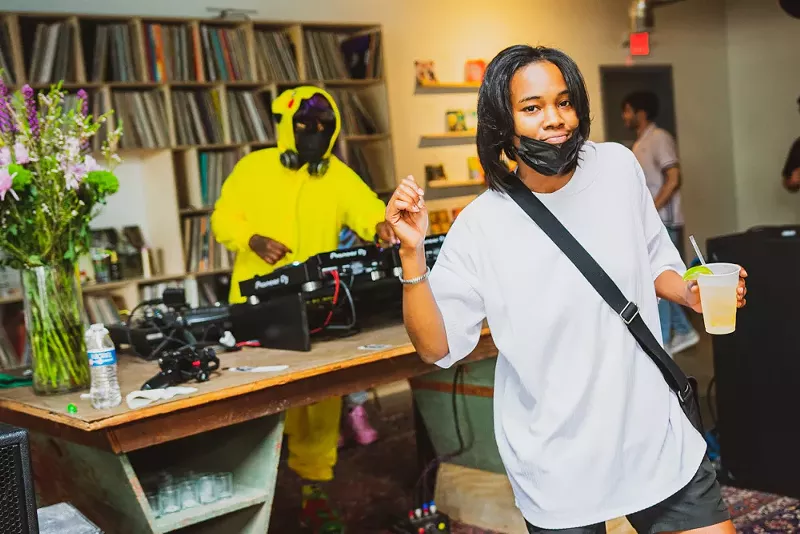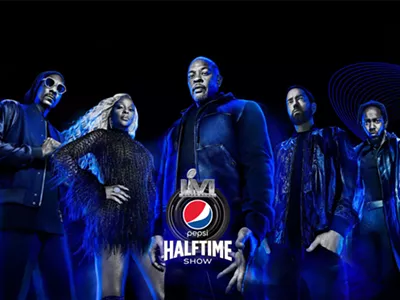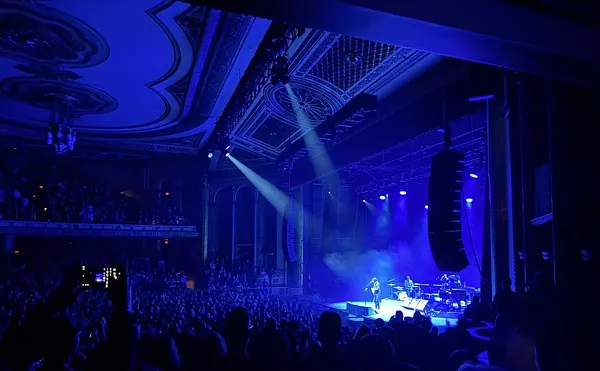
Audio By Carbonatix
[
{
"name": "GPT - Leaderboard - Inline - Content",
"component": "35519556",
"insertPoint": "5th",
"startingPoint": "3",
"requiredCountToDisplay": "3",
"maxInsertions": 100,
"adList": [
{
"adPreset": "LeaderboardInline"
}
]
}
]

We’ve entered a strange period of the pandemic. The government-mandated business shutdowns are over, yet COVID-19 continues to spread. As a result, there are no consistent rules at businesses. Perhaps nowhere is this patchwork of policies more apparent than the live music industry, which is built on people gathering in large crowds.
Like seemingly everything during these polarized times, any decision one way or the other is likely to piss off a lot of people. That was apparently the case this past summer when Detroit’s Marble Bar nightclub became one of the first to announce a policy requiring proof of vaccination or a negative COVID test for all guests. Indeed, a backlash did ensue, and the venue quietly walked back its policy.
Later that summer, some of the nation’s largest concert promoters announced similar policies. Live Nation, which operates the Fillmore and Saint Andrew’s Hall, and AEG Presents, which operates out of the Royal Oak Music Theatre and Detroit’s Masonic Temple, both said they would require proof of vaccination or a negative test from concertgoers starting in the fall.
“We have come to the conclusion that, as a market leader, it was up to us to take a real stand on vaccination status,” Jay Marciano, chairman and CEO of AEG Presents, said in a press release. “We realize that some people might look at this as a dramatic step, but it’s the right one. We also are aware that there might be some initial pushback, but I’m confident and hopeful that, at the end of the day, we will be on the right side of history and doing what’s best for artists, fans, and live event workers.”
Detroit’s El Club followed suit, and even offered free concert tickets to fans who got vaccinated. Meanwhile, other venues (such as the Detroit Opera House) require mask-wearing at all times, regardless of vaccination status, unless eating or drinking.
Yet others went in a different direction. Detroit’s Harpos, known for booking hard rock and hip-hop shows, does not require vaccination “unless requested by the entertainment, promoters, or management,” the venue says on its website. “By entering the venue, attendees voluntarily assume all risks related to exposure to COVID-19,” a disclaimer on the website for the Majestic Theatre Complex warns.
As a testament to how polarizing the issue is, Metro Times could hardly find anyone willing to speak on the record about their venues’ vaccination policies. Representatives from Marble Bar, El Club, and Harpos declined numerous responses for comment. “I’m so burned out on COVID stuff at this point,” one venue promoter says. “Going to politely decline speaking on it since it’s already consuming so much of my mental space as is.” Meanwhile, a number of concerts have recently been canceled or postponed due to COVID-19, the latest being Rage Against the Machine’s big show at Little Caesars Arena, originally scheduled for 2020, which has now been postponed a second time.
The only venue owner who agreed to speak with us was Roula David, who runs Spot Lite, the small electronic music club that opened on Detroit’s east side in May, just in time to help host a scaled-down version of the Movement electronic music festival. It also opened just as Michigan announced it would end its mask mandate for indoors.
“Just from the beginning, we’re like, ‘Oh god, what do we do?’” David says. “Like, should we follow the science? Do we follow the officials? Or do we follow the court of public opinion? And so what we stuck with is that we are just going to follow what the [Centers for Disease Control and Prevention] and what the health department recommends for us, and that’s what we’ve kind of done throughout this entire process.”
The venue quickly became a favorite known for drawing diverse, inclusive crowds, thanks to its casual atmosphere and booking beloved house and techno DJs. David says Spot Lite’s audience led to her decision to not require proof of vaccination. She put up signs recommending guests get vaccinated, but does not check for proof at the door.
“What am I supposed to say? Like, actually, you can’t come in unless you’re vaccinated, which we know is very unpopular with Detroiters?” she says. “My place is a Detroit-oriented space.”
Detroit has the lowest vaccination rate in the metropolitan area at 46%, according to Michigan’s COVID vaccination dashboard, compared to Wayne County’s 72%, Oakland County’s 76%, and Macomb County’s 63%.
She adds, “For me to ask things of people that the government doesn’t even ask them, I just think that’s an unfair place to put a business owner, because it does make you polarizing.”
David requires her staff to be vaccinated, however.
“At the end of the day, for me, as a business owner, my responsibility is to protect my team,” David says. “When people come to work, they don’t have a choice — they have to work, they have to make a living — but you as a customer, and as a consumer, you have a choice to come in here. So it’s your choice to take the risk to go out, to make the decisions that you want, to make the best decision for your mental health and your physical health.”
David says she understands why some venues decided on a proof of vaccination policy. “I think they’re all just scared of their business, scared of what was going to happen,” she says. “They felt that was the right decision for them. It wasn’t the right decision for Detroiters.”
The venue, located in a former warehouse, has a number of features that David says help it weather the pandemic, including large garage doors that she kept open during the summer and fall. She says that they also installed a $120,000 HVAC system, as well as floor fans throughout the venue to keep air moving. There’s also an outdoor bar in an attached alley where people can go and get some fresh air.
Given the recent rise of the omicron variant of the virus, which can cause breakthrough infections in the vaccinated, David says she decided to use proceeds from Spot Lite’s New Year’s Eve event to give her staff two weeks of paid time off, which she encouraged them to use to get booster shots. She says she did it because it seemed like the safest way to move forward, and with the government no longer offering payroll protection and pandemic unemployment for businesses to close, employers need to find some way to operate safely.
“Everyone can make the decisions they need to make for their own businesses,” she says. “Because right now, the government and the CDC and the health department, they’re basically like, ‘You’re on your own. Figure it out.’”
Stay connected with Detroit Metro Times. Subscribe to our newsletters, and follow us on Google News, Apple News, Twitter, Facebook, Instagram, or Reddit.






